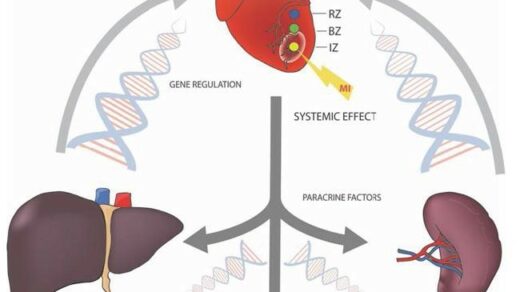The Trending With Impact series highlights Oncotarget publications attracting higher visibility among readers around the world online, in the news and on social media—beyond normal readership levels. Look for future science news about the latest trending publications here, and at Oncotarget.com.
—
EGFR (epidermal growth factor receptor) is a crucial protein that plays a significant role in various biological processes such as cell growth, proliferation, differentiation, and survival. Dysregulation of EGFR signaling has been implicated in the development and progression of numerous human cancers, including lung, breast and colon cancer. Therefore, EGFR has emerged as an attractive target for cancer therapy, and several drugs that target EGFR are in clinical use or under investigation.
In recent years, endocytosis, the process by which cells internalize molecules and transport them into intracellular compartments, has emerged as a critical modulator of EGFR signaling. Endocytosis of EGFR not only regulates the duration and intensity of EGFR signaling but also modulates the signaling output. Dysregulation of EGFR endocytosis has been implicated in the development of drug resistance to EGFR-targeted therapies, highlighting the importance of understanding the mechanisms that regulate EGFR endocytosis.
In a new editorial perspective, researchers Aysegul Sapmaz and Ayse Elif Erson-Bensan from Middle East Technical University provide an overview of the recent advances in our understanding of EGFR endocytosis and its role in EGFR signaling and cancer. The authors highlight the importance of the dynamic interplay between EGFR endocytosis and downstream signaling pathways and discuss how aberrant EGFR endocytosis contributes to drug resistance to EGFR-targeted therapies. On April 10, 2023, their editorial perspective was published in Oncotarget’s Volume 14, entitled, “EGFR endocytosis: more than meets the eye.”
“Here we review the role of the EGF-SNX3-EGFR axis in breast cancers with an extended discussion on deregulated EGFR endocytosis in cancer.”
EGFR Endocytosis
In a recent 2022 study, Sapmaz, Erson-Bensan and their team made significant contributions to understanding the role of deregulated endocytosis in cancer by describing the tumor suppressor role of Sorting Nexin 3 (SNX3) in triple-negative breast cancers (TNBCs). SNX3 is a protein-coding gene belonging to a family of proteins called sorting nexins, which are involved in sorting and trafficking of cellular membrane proteins and lipids. At the conclusion of their study, the researchers found that SNX3 is a critical player in TNBCs through the EGF-SNX3-EGFR axis.
“SNX3, an endosomal trafficking protein, is an emerging tumor suppressor in breast cancers as a target of the EGF activated EGFR pathways and a modulator of EGFR protein levels.”
In the current editorial perspective by Sapmaz and Erson-Bensan, they discuss overexpression of EGFR and its activating mutations linked to various cancer phenotypes, including stemness, metastasis and drug resistance. Endocytosis and the internalization of EGFR play a crucial role in regulating its activity, which is dependent on post-translational modifications and regulated by various proteins, including ubiquitin. Deregulation of these players in endocytic processes has significant implications for EGFR activity in cancers. The ubiquitination status of EGFR and other proteins in the endocytic pathway is functionally essential and is balanced by E3 ubiquitin ligases and deubiquitinating enzymes (DUBs). Targeting these enzymes to alter ubiquitination dynamics could offer future perspectives in manipulating EGFR endocytosis and signaling in cancers.
The researchers discuss the non-canonical functions of endocytosis and endocytosis-related proteins, such as their involvement in nucleocytoplasmic shuttling and transcriptional activity. Several endocytic proteins have been found to interact with nuclear proteins and modulate gene transcription. Examples include EPS15, EPN1 and RNF11, which can shuttle between the cytoplasm and nucleus and have been shown to positively regulate transcription. Other endocytic proteins and adaptors have also been found to shuttle between the cytoplasm and nucleus with functions in endocytosis and gene expression. The authors emphasize the need for a better understanding of both the canonical and non-canonical functions of endocytic processes for normal physiology and diseases, including cancer and other pathologies.
“A better understanding of these backstage mechanisms will allow a more comprehensive understanding of receptor fate and activity.”
Conclusions
In conclusion, EGFR and its regulation through endocytosis have emerged as critical players in cancer development and progression. Dysregulation of EGFR endocytosis has been implicated in drug resistance to EGFR-targeted therapies, highlighting the importance of understanding the mechanisms that regulate this process. Recent advances in our understanding of EGFR endocytosis and its role in cancer have revealed the critical interplay between EGFR signaling and downstream pathways. The research by Sapmaz and Erson-Bensan sheds light on the tumor suppressor role of SNX3 in TNBCs and highlights the need for a better understanding of the canonical and non-canonical functions of endocytic processes in normal physiology and diseases, including cancer. Future research focusing on manipulating EGFR endocytosis and signaling could offer new perspectives on cancer therapy.
“Finally, before we can consider key endocytosis regulators as therapeutic targets, these candidate proteins must also be evaluated within the context of potential feedback mechanisms to modulate the biosynthesis and repopulation of receptors in cancer cells.”
Click here to read the full editorial perspective in Oncotarget.
—
Oncotarget is an open-access, peer-reviewed journal that has published primarily oncology-focused research papers since 2010. These papers are available to readers (at no cost and free of subscription barriers) in a continuous publishing format at Oncotarget.com. Oncotarget is indexed/archived on MEDLINE / PMC / PubMed.
Click here to subscribe to Oncotarget publication updates.
For media inquiries, please contact media@impactjournals.com.



